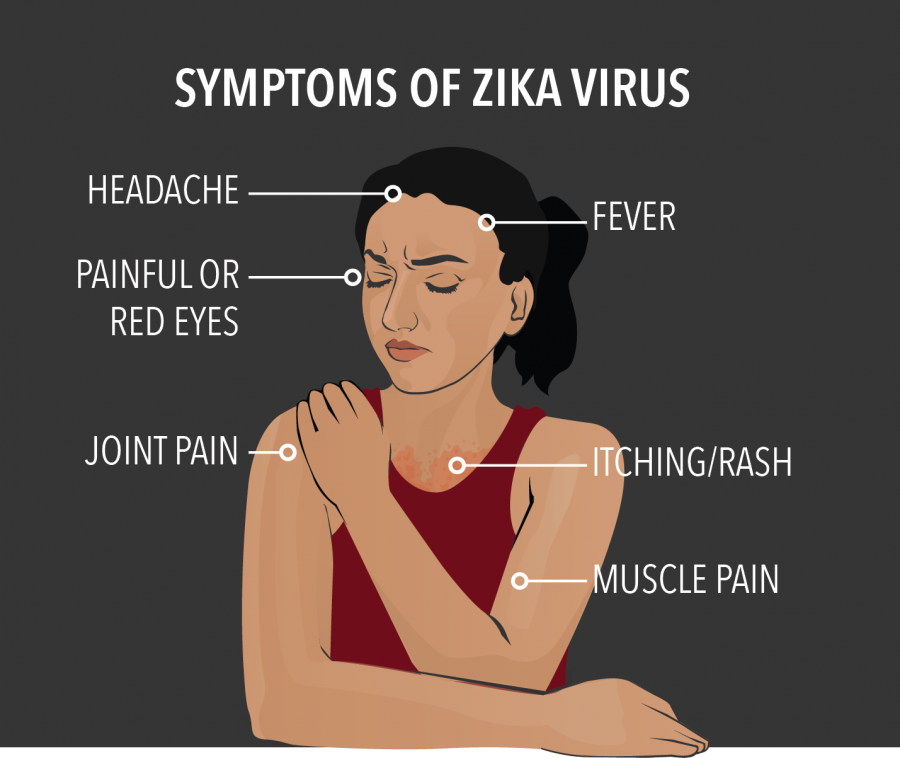Students Take Caution to Avoid Zika Virus
April 14, 2016
There are currently over three hundred confirmed cases of Zika in the United States, including multiple cases in both Washington and Oregon. Although it is unlikely that infected mosquitoes will bring the virus to Walla Walla within the next few years, students traveling to Central and South America should take precautions to avoid Zika.
Although American media coverage of Zika has grown over the last few months, the virus was first identified in Uganda in 1947. Zika is primarily transmitted through mosquitoes and there is a proven link to microcephaly, a birth defect that causes babies’ heads to be smaller and less developed.
The World Health Organization declared Zika a public health emergency this past February, and the Centers for Disease Control and Prevention advise pregnant women not to travel to countries with Zika. While Brazil has the highest amount of Zika cases, Zika has been found in most Central and South American countries, including Ecuador and Panama, both of which have Whitman College approved study abroad programs.
This February Susan Holme, director of Off-Campus Studies, sent an email to all students studying abroad with information about Zika and suggestions for protection from the virus. The email encouraged students to wear long clothing, stay in air conditioned buildings away from mosquitoes, sleep under a mosquito net and use insect repellant. Holme also suggested that sexually active students practice safe sex since there is evidence that suggests Zika can be spread through semen.
Zika presents flu-like symptoms such as a fever, joint pain, rash and red eyes. However, most people infected with Zika have mild symptoms and may not realize that they have the virus. Professor of Biochemistry, Biophysics and Molecular Biology James Russo believes that this is one of the reasons why travelers are concerned.
“You aren’t likely to know whether or not you are infected. There aren’t any simple antibody tests to distinguish it from dengue. That’s the part that makes people most uncertain, they wouldn’t know if they came back with Zika virus.” While there are currently no simple antibody tests available yet to determine if an individual is infected with Zika, they are in development.
Health Center Director Claudia Ness believes that the chances of students contacting Zika is relatively low, but she advocates for insect precautions to limit the chances of being exposed to Zika, malaria, dengue fever and yellow fever.
“Zika is just another one of those viruses that you will need to have good insect precautions for–you need to know where you are going and what the risks are,” Ness said. “If students are going to be working outside or camping they should take full precautions.”
Junior Hannah Alverson is currently studying abroad in South America with SIT Ecuador: Comparative Ecology and Conservation. Most of her time is spent in Quito, which is at a high enough elevation that mosquitoes are very uncommon. However, she did take precautions to avoid insect bites while visiting the Amazon.
“Zika wasn’t a concern [in the Amazon]. We were more worried about malaria, other mosquito borne illnesses and just being annoyed by bug bites,” said Alverson in an email to The Pioneer.
SIT Ecuador concludes the semester with an independent research project, but the students on the program are not allowed to do their research on the coast. According to Alverson, this is partially due to Zika. “I have avoided traveling to the coast because of Zika, but my friends who have gone have said that they didn’t see any mosquitoes. I think it depends on the part of the coast that you go to.”
Whitman College students should take precautions to avoid insect bites while in Central and South America, but both Ness and Russo believe that students should not be overly concerned with Zika.
“I would hesitate to go to South America myself if I was a young woman who was pregnant or thinking about getting pregnant,” Ness said. “If you are planning study abroad or a trip, you need to weigh the risks and benefits. If you are the kind of person who is going to be really good at sticking to the insect precautions–wearing long clothing, using a mosquito net and putting on bug spray–go for it, but if you are a little more laid back then you may want to put a bit more thought into the place that you go.”
“Relative to the other things that are [in Central and South America]–malaria and dengue fever–it is hard for me to say that Zika should make you more worried. If you were already okay going to a place that already has endemic dengue and other things, adding Zika to the mix shouldn’t change that decision making at all,” Russo said. “If I knew that I was very early in pregnancy I wouldn’t go, probably, because of the strong evidence that it could have a very direct effect on my child.”












